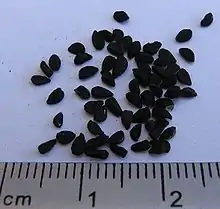nigella
See also: Nigella
English

Nigella
Etymology
From Scientific Latin, from Late Latin nigella. Doublet of nielle.
Pronunciation
- IPA(key): /naɪˈd͡ʒɛlə/
- Rhymes: -ɛlə
Noun
nigella (countable and uncountable, plural nigellas)
- Any plant of the genus Nigella of about twelve species of annual flowering plants, the blooms of which are generally blue in colour but also found in shades of pink, white and pale purple.
- The seeds of the plant Nigella sativa, used as a culinary spice.
Translations
plant of the genus Nigella
|
spice — see black caraway
Further reading
 nigella on Wikipedia.Wikipedia
nigella on Wikipedia.Wikipedia  nigella on Wikispecies.Wikispecies
nigella on Wikispecies.Wikispecies  Category:nigella on Wikimedia Commons.Wikimedia Commons
Category:nigella on Wikimedia Commons.Wikimedia Commons
Italian
Etymology
From Scientific Latin, from Late Latin nigella, from the feminine of Latin nigellus. Cf. also niello.
Pronunciation
- IPA(key): /niˈd͡ʒɛl.la/
- Rhymes: -ɛlla
- Hyphenation: ni‧gèl‧la
Latin
Pronunciation
- (Classical) IPA(key): /niˈɡel.la/, [nɪˈɡɛlːʲä]
- (modern Italianate Ecclesiastical) IPA(key): /niˈd͡ʒel.la/, [niˈd͡ʒɛlːä]
Descendants
References
- Walther von Wartburg (1928–2002) “nĭgĕlla”, in Französisches Etymologisches Wörterbuch (in German), volumes 7: N–Pas, page 128
Adjective
nigella
- inflection of nigellus:
- nominative/vocative feminine singular
- nominative/accusative/vocative neuter plural
This article is issued from Wiktionary. The text is licensed under Creative Commons - Attribution - Sharealike. Additional terms may apply for the media files.
